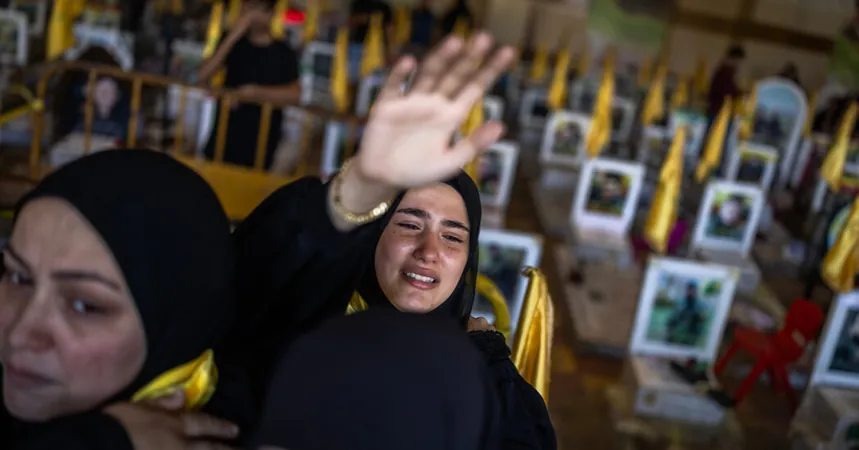
Escalating Tensions: Netanyahu and Hezbollah Exchange Severe Threats amid Intense Military Actions
2024-09-22
Overview of the Situation
In a significant escalation, Hezbollah launched over 100 rockets, missiles, and drones into Israeli territory overnight as retaliation for a series of Israeli airstrikes targeting its leadership and communications networks in Lebanon. This response follows the recent destruction of Hezbollah pagers and walkie-talkies, which were believed to be targeted by Israeli forces, leading to many casualties and injuries among Hezbollah militants and civilians alike.
Reactions from Israeli Leadership
Israeli Prime Minister Benjamin Netanyahu addressed the situation on Sunday, hinting at the military's unexpected successes against Hezbollah. 'If Hezbollah didn’t understand the message, I assure you it will,' he stated, emphasizing Israel’s intention to restore peace to northern regions impacted by the cross-border violence.
Military Response and Impact
Israeli military officials echoed this sentiment, with Lt. Gen. Herzi Halevi remarking, 'Our strikes will intensify,' as they condemned Hezbollah's nighttime assault. The firm messaging underscores a significant commitment from the Israeli military to respond to any aggression.
Hezbollah's Attack and Casualties
Hezbollah claimed the rocket barrage aimed to strike Israeli military bases, affecting towns in the northern region and causing air-raid sirens to sound across several communities, including the strategic port city of Haifa. Although most missiles were intercepted, one hit a residential area, injuring three individuals and causing damage to homes and local businesses.
Geographical Shift in Conflict
The strikes mark a noticeable shift in the conflict's geography; they mark some of the farthest rockets to hit Israel from Hezbollah, significantly impacting areas not commonly targeted in previous exchanges. This calculated display of force, however, avoided the heart of Israel, likely in an effort to prevent triggering a more severe retaliatory campaign from Israel.
Escalation of Hostilities
Amid rising concerns over the conflict, Hezbollah’s deputy leader, Naim Qassem, addressed a gathering in memory of a fallen commander, asserting that 'what happened last night is just the beginning.' His comments suggest Hezbollah may be preparing for a broader military engagement amidst escalating hostilities.
International Response
International alarm is growing. President Biden expressed concern over the rising tensions, stating that efforts would be made to prevent a wider conflict. The United Nations and the European Union have both noted the dire humanitarian impacts, calling for de-escalation from both sides in light of the high civilian toll.
Regional Concerns
In related news, Israeli operations are ostensibly shifting focus. Following a recent attack from Iraq by Iran-backed forces firing drones at Israel, the Israeli military intercepted incoming fire, spotlighting a broader regional concern about the intertwining conflicts involving multiple militant groups aligned with Iran.
Human Cost of the Violence
In a tragic indication of the human cost of this ongoing violence, Lebanese authorities report an airstrike in Beirut on Friday had resulted in at least 45 deaths, including women and children, sparking condemnation from organizations like Hezbollah. Among the deceased was a senior commander wanted in the U.S. for his involvement in the notorious 1983 bombings that claimed hundreds of lives.
Ongoing Conflict in Gaza
Simultaneously, the conflict in Gaza continues, with recent Israeli airstrikes on a Gaza school resulting in further casualties among displaced persons. Amidst the chaos, Israeli forces also raided the offices of Al Jazeera in the West Bank, emphasizing their increasing efforts to control media narratives concerning the conflict.
Civilian Perspectives and Future Outlook
With both sides seemingly entrenched in their positions, cities along the border are placing residents on high alert, reflecting a pervasive sense of vulnerability. In Kiryat Bialik—a community with a history of being targeted during past hostilities—residents expressed fear and frustration over the ongoing violence, echoing sentiments that perhaps more decisive action must be taken against threats emanating from Hezbollah.
Conclusion
Overall, the renewed exchange of hostilities indicates a protracted phase of conflict, with military actions escalating across multiple fronts—raising concerns that regional stability may hang by a thread as both sides prepare for what might be a drawn-out confrontation. As tensions boil and civilian casualties mount, a chilling prospect looms: the potential for a full-scale war, dragging neighboring nations into an already complex web of conflict. Will diplomatic efforts prevail in time to halt a devastating escalation? The world watches and waits, anxious for any signs of resolution.




 Brasil (PT)
Brasil (PT)
 Canada (EN)
Canada (EN)
 Chile (ES)
Chile (ES)
 España (ES)
España (ES)
 France (FR)
France (FR)
 Hong Kong (EN)
Hong Kong (EN)
 Italia (IT)
Italia (IT)
 日本 (JA)
日本 (JA)
 Magyarország (HU)
Magyarország (HU)
 Norge (NO)
Norge (NO)
 Polska (PL)
Polska (PL)
 Schweiz (DE)
Schweiz (DE)
 Singapore (EN)
Singapore (EN)
 Sverige (SV)
Sverige (SV)
 Suomi (FI)
Suomi (FI)
 Türkiye (TR)
Türkiye (TR)